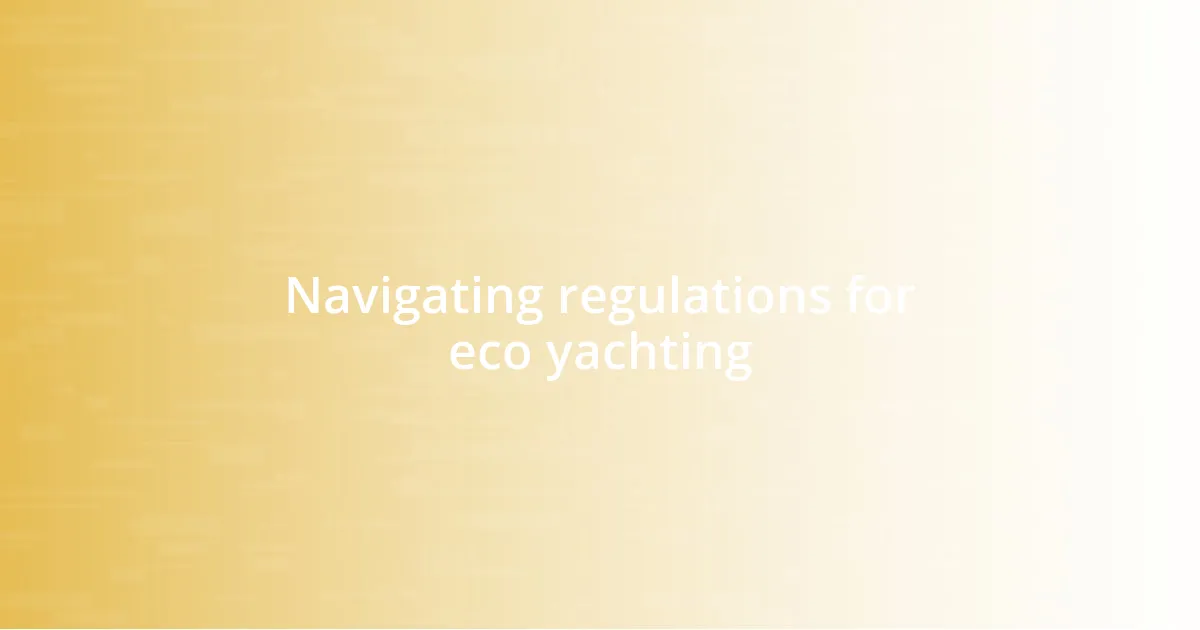Key takeaways:
- Eco-friendly yachting emphasizes sustainable practices, including the use of renewable energy sources and materials, reducing environmental impact while enhancing the yachting experience.
- Benefits of eco-friendly yachts include reduced noise and air pollution, long-term cost savings through lower fuel and maintenance costs, and improved social responsibility among yacht owners.
- Techniques for sustainable yachting involve utilizing solar panels, water conservation methods, efficient waste management, and low-emission propulsion systems to minimize ecological footprints.
- The future of eco-friendly yachting is marked by innovations like electric propulsion systems, algae-based biofuels, and smart technology for monitoring energy usage to promote responsible practices.

Understanding eco-friendly yachting
Eco-friendly yachting is more than just a trend; it’s a way to reconnect with our oceans responsibly. When I first stepped onto a solar-powered yacht, I felt a wave of excitement—knowing that I was part of something bigger. It struck me that every sail had the potential to make a positive impact on our environment, rather than harm it.
Sustainability in yachting involves choosing materials that minimize environmental footprint, like recycled aluminum or bamboo for interiors. Recently, while researching options for my own future yacht, I discovered some stunning eco-friendly fabrics made from discarded fishing nets. Don’t you think it’s amazing when beauty and sustainability come together like that?
Furthermore, eco-friendly yachting promotes practices that protect marine life and reduce our carbon output. For instance, using eco-conscious propulsion systems can help cut down on harmful emissions. I often ponder, what if more yacht owners embraced these innovative technologies? Imagine the difference we could make—to our oceans, to our planet, and to future generations.

Benefits of eco-friendly yachts
The benefits of eco-friendly yachts are both profound and practical. I remember the thrill of cruising on an electric yacht for the first time; the silence was striking. There’s something incredibly serene about gliding across the water without the roar of a traditional engine. This tranquility not only enhances the experience for the passengers but also reduces noise pollution, allowing marine life to thrive undisturbed.
Another significant advantage is cost-effectiveness over the long term. When I explored solar panels for my own yacht, I realized how much I could save on fuel. It’s fascinating how investing in renewable energy not only conserves the environment but also keeps more money in my pocket. Who wouldn’t appreciate lower operational costs, especially after spending money on maintenance and docking fees?
Additionally, eco-friendly yachts can enhance your reputation among peers. I’ve enjoyed conversations with fellow yacht enthusiasts who admire my choice to go green. It sparked discussions about the importance of sustainability in boating, encouraging others to consider their impact as well. It’s rewarding to feel that I’m leading by example, inspiring a shift towards responsible yachting in my circle.
| Benefit | Description |
|---|---|
| Environmental Impact | Reduces noise and air pollution, protecting marine life and fostering healthier oceans. |
| Cost Efficiency | Lower fuel and maintenance costs through renewable energy sources. |
| Social Responsibility | Enhances reputation and inspires others to consider eco-friendly choices in yachting. |

Techniques for sustainable yachting
Sustainable yachting techniques not only enhance the experience at sea but also reflect a genuine commitment to our planet. I recall a memorable outing where I participated in a beach clean-up before a yachting trip. It was a beautiful day, and the light breeze felt refreshing while we collected debris—everyone was in great spirits. That same level of dedication should apply to how we maintain our vessels. Simple strategies, like using biodegradable cleaning products and minimally invasive anchoring techniques, can significantly reduce our ecological footprint.
Here are some effective techniques for sustainable yachting:
- Renewable Energy Sources: Utilizing solar panels and wind turbines on board not only powers your yacht sustainably but also contributes to a cleaner environment.
- Water Conservation: Implementing water-saving technologies, like efficient filtration systems, helps minimize freshwater usage while ensuring access to clean water.
- Eco-Friendly Materials: Opting for sustainable products in yacht construction, such as bamboo and recycled plastics, lowers environmental impact without sacrificing quality.
- Efficient Waste Management: Adopting composting toilets and waste separation on board can minimize landfill contributions and promote responsible disposal practices.
- Low-Emission Propulsion Systems: Exploring hybrid or fully electric propulsion can greatly reduce harmful emissions and enhance overall efficiency.
On a recent sailing adventure, I experimented with these techniques firsthand. Our team decided to try a new composting toilet system, and while it was a change, the benefits became clear. We all felt more connected to our surroundings, knowing we were making conscious decisions that upheld the beauty of our marine environment. It truly altered my perspective on the delicate balance we hold with nature.

Choosing eco-friendly materials
Choosing eco-friendly materials for your yacht can significantly reduce your environmental impact while also enhancing the overall aesthetic and functionality of your vessel. I remember when I first switched to using sustainable wood alternatives like bamboo. The warmth and beauty of the material were undeniable, and knowing that I was supporting responsible forestry practices as I outfitted my yacht felt deeply satisfying. Isn’t it incredible how a simple choice can contribute to forest conservation?
When it comes to other materials, I’ve been particularly impressed with the rise of biodegradable composites and recycled plastics in marine applications. During my last renovation, I outfitted my decks with a product made from recycled fishing nets. It not only minimized waste but also provided a durable surface that stood up to the elements. It felt great to know that I was giving a second life to materials that would otherwise have polluted our oceans. Have you ever considered how consumer choices can directly affect ocean health?
The transition to eco-friendly materials doesn’t have to sacrifice quality or performance; in fact, many sustainable options often exceed traditional materials in these areas. I’ve had fantastic experiences with eco-friendly fabrics for upholstery that are both beautiful and easy to clean. It’s refreshing to see that sustainability is becoming synonymous with luxury in yachting. So, why not embrace these options that allow us to enjoy our time on the water while caring for the planet?

Navigating regulations for eco yachting
Navigating the regulations for eco yachting can feel like a daunting task, especially with the myriad of local and international laws in play. I remember attending a workshop where industry experts explained the importance of understanding Environmental Protection Agency (EPA) guidelines. It struck me how essential compliance is, not just for legal reasons but to demonstrate our commitment to preserving marine ecosystems. Can you imagine the impact we could make if every yacht owner took these regulations to heart?
One key aspect I’ve found beneficial is staying updated on regional mandates regarding emissions and waste disposal. For instance, I once received a warm welcome at a docking facility that enforced strict environmental protocols. Participating in their eco-friendly initiatives made me feel like part of a movement, rather than just a visitor. It became clear to me that these regulations aren’t just hurdles; they’re opportunities to connect with like-minded individuals dedicated to the same cause.
Moreover, working with professionals who specialize in eco-compliance can smooth the process significantly. On one occasion, I consulted an expert before purchasing my current yacht, and their insights on sustainable certifications and renewable energy systems were invaluable. It felt empowering to approach my yachting journey informed and ready to make choices aligned with responsible practices. When it comes down to it, navigating these regulations not only sets a standard but enhances our experience at sea. Isn’t it reassuring to know our shared journey can positively impact the world we cherish?

Tips for reducing yacht emissions
One of the simplest yet most effective ways to reduce yacht emissions is to optimize your engine performance. I learned this firsthand when I decided to have regular tune-ups and maintenance checks on my yacht. The mechanic shared that a well-maintained engine could improve fuel efficiency by up to 15%. Have you ever considered how much fuel and emissions you might save with a little proactive care?
On my last trip, I also experimented with using sails more frequently instead of relying solely on the engine. It was not just a nod to sustainability but an exhilarating experience to feel the wind fill the sails. I discovered that not only was I reducing emissions, but I was also reconnecting with the essence of sailing. Isn’t it amazing how embracing traditional sailing can lead to a more enriching and environmentally-friendly experience on the water?
Lastly, integrating renewable energy sources like solar panels can drastically cut down on reliance on fossil fuels. When I installed my first set of solar panels, I was initially skeptical, wondering if they would truly make a difference. To my delight, they were not only efficient but offered a sense of independence while on long voyages. Imagine how empowering it feels to harness the sun’s energy and reduce our carbon footprint at the same time! Have you thought about how adopting such technology could elevate your yachting experience?

Future of eco-friendly yachting innovations
When I think about the future of eco-friendly yachting innovations, what stands out to me is the rapid evolution of electric propulsion systems. Just last summer, I had the chance to demo a hybrid yacht that utilized both electric and diesel power. The silent cruising mode was unbelievable—it felt like gliding through an untouched paradise. Have you ever experienced the tranquility that comes with reducing engine noise? It truly reshapes how we appreciate the serenity of the open water.
I’m also excited about developments in biofuels. At a recent marine sustainability expo, I learned about algae-based fuels that can significantly lower carbon emissions. Imagine fueling your yacht with something derived straight from nature! I remember speaking with an engineer who detailed how these fuels might one day be as accessible as traditional diesel. It got me thinking: if we embrace these innovations, how much closer could we get to preserving the oceans we love so dearly?
Another area poised for growth is smart technology integration, like using apps to monitor a yacht’s energy usage in real-time. During one of my trips, I tried an app that highlighted how much power I was consuming while onboard. Watching the numbers change in response to my actions was a real eye-opener. Could automation lead to a more conscientious approach to how we navigate the seas? As these technologies develop, I believe they will empower us to make informed decisions that align with sustainable practices, blending adventure with responsibility.















